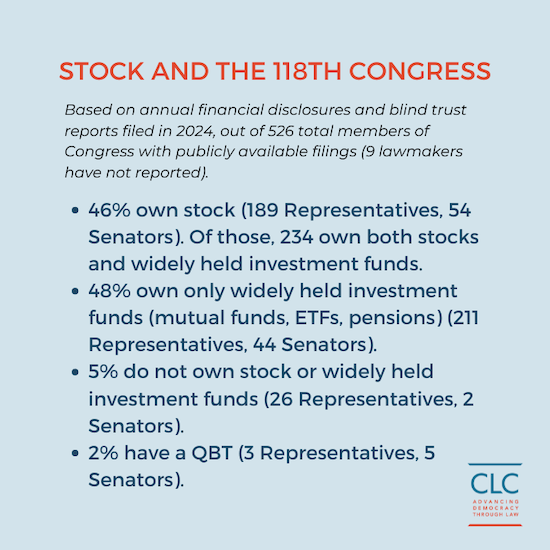Campaign Legal Center (CLC) filed a complaint with the Office of Congressional Ethics (OCE) alleging that Rep. Byron Donalds (R-FL) violated the Stop Congressional Trading on Insider Knowledge (STOCK) Act by failing to timely disclose over 100 stock transactions worth up to $1.6 million.
The STOCK Act requires members of Congress to file Periodic Transaction Reports (PTRs) within 45 days of trading any stock. This provides constituents with real time information about their representatives’ potential conflicts of interest.
Filing PTRs after the 45-day deadline is a problematic violation of the law, but Rep. Donalds has taken it further by failing to file these required disclosures at all.
Despite publicly stating his support for enforcing the STOCK Act, Rep. Donalds is now the latest in a bipartisan pattern of members failing to meet the Act’s disclosure requirements.
In 2021, CLC filed complaints against several lawmakers in both parties for the same infraction.
Throughout 2022 and 2023, Rep. Donalds made at least 108 trades in dozens of companies with a total value ranging from $108,108 to $1,620,000. Concerningly, some of the trades were in companies that donated to his campaign or lobbied bills that he sponsored or cosponsored.
The penalties for failure to disclose stock ownership or trades are minimal in comparison to the value of the assets themselves. Given that the threat of a nominal fine has not prevented repeat violations, it’s clear that the STOCK Act has fallen short of its goal to penalize insider trading and increase public trust in government.
More importantly, the STOCK Act does not prohibit lawmakers from trading in companies over which they have significant influence, including within the jurisdiction of their committees. This raises serious concerns about our elected representatives and their potential conflicts of interest.
CLC completed Congressional Stock Trading by the Numbers, an exhaustive review of all annual financial disclosure reports filed by members of Congress this year. The review found that 44% of the House and 54% of the Senate own stock. Only 6% of the House and 2% of the Senate do not hold any stock or widely held investment funds.
Congressional stock owners were busy in 2023, making around 11,000 trades throughout the year. Democrats in particular enjoyed great success, with a rate of return well over the S&P 500 Index.
When considering what private information lawmakers have access to, it is clear that engaging (and often benefitting) from stock poses a conflict of interest. The public is ready for reform: 86% of people across party lines support prohibiting members of Congress from trading stocks.
Luckily, a new bipartisan solution offers a pathway to vital reforms that can rebuild public confidence in our federal government. Congress must pass the End Trading and Holdings in Congressional Stocks (ETHICS) Act, which would ban members of Congress (as well as the president and vice president) from buying or selling stocks and other securities, commodities, or futures while in office.
Under the ETHICS Act, if a covered elected official fails to divest or conducts a trade while in office, they face a penalty equal to their monthly salary, or 10% of the value of the covered asset, whichever is greater. This penalty more adequately reflects the seriousness of an elected official breaking the public’s trust and goes far beyond current penalties under the STOCK Act, which start at a nominal $200.
Thanks to an agreement between Senators Gary Peters (D-MI), Jeff Merkley (D-OR), Josh Hawley (R-MO), and Jon Ossoff (D-GA), the ETHICS Act made it to the U.S. Senate Committee on Homeland Security and Governmental Relations, which voted affirmatively to send the bill to the Senate floor.
Congress has an opportunity to solve a bipartisan issue with a bipartisan solution. Passing the modified ETHICS Act can help rebuild public confidence that our lawmakers are working for the people over personal financial interest.



